|
|
|
Sort Order |
|
|
|
Items / Page
|
|
|
|
|
|
|
| Srl | Item |
| 1 |
ID:
148195
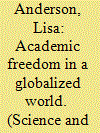

|
|
|
|
|
| Summary/Abstract |
At the 153rd annual meeting of the National Academies of Sciences, Engineering, and Medicine in early May 2016, the Academies’ Committee on Human Rights invited Lisa Anderson, recent past president of the American University in Cairo, dean emerita of Columbia University’s School of International and Public Affairs, and former member of the board of Human Rights Watch, to reflect on current issues surrounding academic freedom. This article is adapted from her remarks.
|
|
|
|
|
|
|
|
|
|
|
|
|
|
|
|
| 2 |
ID:
181823
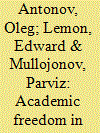

|
|
|
|
|
| Summary/Abstract |
While there have been a number of studies of the political economy of knowledge production in Central Asia, the often exploitative relations between foreign and local researcher, there has been less discussion of what Elizabeth Perry recently described as the ‘scholar–state’ nexus: how authoritarian rule rests on the suppression of independent academics, the ‘educated acquiescence’ of academia or their incorporation into the ‘factory of answers’. Through the concepts of suppression, acquiescence and incorporation, this article examines how restrictions on academic freedom have an impact on knowledge production in Tajikistan.
|
|
|
|
|
|
|
|
|
|
|
|
|
|
|
|
| 3 |
ID:
178229


|
|
|
|
|
| Summary/Abstract |
This article builds on the ambiguous concept of the autonomy of universities with three historical turns in two dominant types of universities in the world – the Anglo-Saxon and American models, represented by the British and American institutions, and the Continental models, including the recently emerging Chinese University 3.0. Based on empirical data from two comparative case studies with a documentary analysis approach, I investigate the structure of the zhong-yong model of self-mastery, demonstrating how it may differ from the Western models and offering cultural interpretations for these nuances. The article concludes that self-mastery in the Chinese context provides an additional form of autonomy which is rooted in the pragmatic Confucian concept of zhong-yong. It is also found that through the pragmatism of self-mastery, the zhong-yong model enables Chinese universities to directly serve the state and, at the same time, to legitimate the priority given to their development by state power, thus creating abundant space and resources for them to fully unfold their potentialities. With multilayered and multidirectional power relationships, this model of governance has enabled Chinese universities to radically transform themselves in a short period of time and will allow them to eventually become global leaders, although they may have to sacrifice autonomous freedom in some ways.
|
|
|
|
|
|
|
|
|
|
|
|
|
|
|
|
| 4 |
ID:
180568
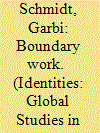

|
|
|
|
|
| Summary/Abstract |
Theoretically, this article investigates the politicisation of migration research in relation to boundary work between different spheres of the Danish public debate about migration, including research, media and politics. Empirically, the article analyses the roles that Danish migration researchers have played in such debates over the last two decades. Besides, the article presents and analyses results from a survey among migration researchers employed in four of Denmark’s six universities. The survey showed that while the majority of respondents did not feel unsafe participating in the public debate about migration, more than two out of five did. Jeopardising one’s professional reputation appeared to be a major concern. The article ends with a discussion of the survey results in relation to academic boundary work and presents suggestions for the road ahead, both for individual researchers and academic institutions.
|
|
|
|
|
|
|
|
|
|
|
|
|
|
|
|
| 5 |
ID:
150490
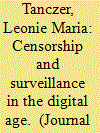

|
|
|
|
|
| Summary/Abstract |
The “Snowden leaks” and censorship methods used during the Arab Spring have brought warranted attention to technologically supported censorship and surveillance (Bauman et al. 2014; Deibert and Crete-Nishihata 2012, 344). The public is now aware how digital tools and information are prone to tracing, interception, and suppression. Processes of eavesdropping and information collection (i.e., surveillance) are often interrelated with processes of removal, displacement, and restriction of material or speech (i.e., censorship). Both are often enshrouded in secrecy, leaving censorship and surveillance techniques open to abuses (Setty 2015).
|
|
|
|
|
|
|
|
|
|
|
|
|
|
|
|
| 6 |
ID:
173315


|
|
|
|
|
| Summary/Abstract |
As faculty members, we rely on academic freedom to protect us as we teach, engage in scholarly research, and live as citizens of a community. The American Association of University Professors is the accepted authority in matters of academic freedom, and its guidelines explain protections in teaching, research, and extramural utterances. This article argues that the characteristics of social media and the concerns of academic institutions about their reputation have created an atmosphere that make extramural utterances more vulnerable and riskier than in the past. Some institutions even monitor the social media postings of faculty members and act on such postings, openly criticizing and even disavowing or punishing them for their utterances. I consider these issues and make a modest proposal that may improve the environment for extramural utterances by faculty members.
|
|
|
|
|
|
|
|
|
|
|
|
|
|
|
|
| 7 |
ID:
162665
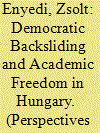

|
|
|
|
|
| Summary/Abstract |
The Hungarian government’s discriminatory actions against the Central European University constitute one of the most prominent conflicts between an academic institution and a government today. My contribution gives a detailed account of how the conflict has unfolded so far. Various frameworks of interpretation, including democratic backsliding, cultural war, and international politics are discussed. I place the story of the university in the context of the polarized cultural climate of Eastern Europe and draw attention to the power of universities in collaborating across borders in defense of academic freedom—and freedom in general.
|
|
|
|
|
|
|
|
|
|
|
|
|
|
|
|
| 8 |
ID:
148286
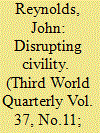

|
|
|
|
|
| Summary/Abstract |
This paper is a reflection on the role of intellectuals in engaging with Palestinian solidarity movements and liberation discourses, and on the place of international lawyers specifically within that context. The paper considers ‘the question of Palestine’ as a rigorous test for intellectuals in the Global North today, and examines particular debates over free speech, civility and balance that unfolded in the wake of Israel’s 2014 war on Gaza. It considers the interventions of international lawyers in these debates with reference to Edward Said’s ‘amateur’ and ‘professional’ intellectuals, and explores ways in which anti-colonial international lawyers (as amateur intellectuals) can transcend prevailing professional orthodoxies to deploy language, arguments or tactics that rupture liberal legal processes and narratives on Palestine.
|
|
|
|
|
|
|
|
|
|
|
|
|
|
|
|
| 9 |
ID:
132058
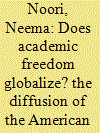

|
|
|
| 10 |
ID:
188737
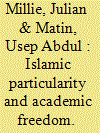

|
|
|
|
|
| Summary/Abstract |
The Indonesian Muslim community includes segments dedicated to contrasting pious projects and doctrinal positions, yet the nation's Ministry of Religion (MORA) manages aspects of Islamic life while purporting to more or less transcend such contrasts. This tension recently emerged in Indonesian public life when a state Islamic university defended the autonomy of its research practices against a challenge by scholars from outside the university who claimed that the doctoral project of Jalaluddin Rakhmat (1949–2021) offended doctrinal positions of the Sunni majority and gave priority to Shiite historiography and doctrine. This dispute shows how questions concerning academic method become disputes about public interest, and further, its resolution attests to the emergence of free inquiry as an Islamic value in the environment of MORA's universities. Academics cited the example of earlier generations of scholars as supporting precedent for an Islamic principle of free inquiry.
|
|
|
|
|
|
|
|
|
|
|
|
|
|
|
|
| 11 |
ID:
085390


|
|
|
|
|
| Publication |
2008.
|
| Summary/Abstract |
If we postulate that International Relations is not meeting the expectations that many have assigned to it, and that it may even be at risk of losing some of its intellectual appeal in the foreseeable future, what could the reasons be? This essay seeks to provide answers by identifying three general problems that the field currently faces, in many respects as a result of its increasing professionalization. The first is the excessive need of IR scholars to operate within the traditional parameters of the field; the second is their too weak relationship with the `real' world; and the third, the absence of freedom that undermines creative, intuitive thinking.
|
|
|
|
|
|
|
|
|
|
|
|
|
|
|
|
| 12 |
ID:
171772


|
|
|
|
|
| Summary/Abstract |
The Internet and digital technologies have become indispensable in academia. A world without email, search engines, and online databases is practically unthinkable. Yet, in this time of digital dependence, the academy barely demonstrates an appetite to reflect upon the new challenges that digital technologies have brought to the scholarly profession. This forum's inspiration was a roundtable discussion at the 2017 International Studies Association Annual Convention, where many of the forum authors agreed on the need for critical debate about the effects of online surveillance and censorship techniques on scholarship. This forum contains five critiques regarding our digitized infrastructures, datafied institutions, mercenary corporations, exploitative academic platforms, and insecure online practices. Together, this unique collection of articles contributes to the research on academic freedom and helps to frame the analysis of the neoliberal higher education sector, the surveillance practices that students and staff encounter, and the growing necessity to improve our “digital hygiene.”
|
|
|
|
|
|
|
|
|
|
|
|
|
|
|
|
| 13 |
ID:
179350


|
|
|
|
|
| Summary/Abstract |
This interpretive visual report interacts with repertoires of graffitied messages photographed at two university campuses in Hong Kong after skirmishes laced with tear gas and fire between students and riot police had ceased. This work is a response to several graffitied images taken in early 2020 after the campus siege of 2019. It is accompanied by a reference to the reverberations of recent watershed developments that have fundamentally changed Hong Kong society and the modern-day University's mission to establish coalescence amidst the diversity of ideas.
|
|
|
|
|
|
|
|
|
|
|
|
|
|
|
|
| 14 |
ID:
031072


|
|
|
|
|
| Publication |
New York, W.W. Norton & Company, 1968.
|
| Description |
158p.
|
|
|
|
|
|
|
|
|
|
|
|
Copies: C:1/I:0,R:0,Q:0
Circulation
| Accession# | Call# | Current Location | Status | Policy | Location |
| 012428 | 323.44/SAL 012428 | Main | On Shelf | General | |
|
|
|
|
| 15 |
ID:
148194
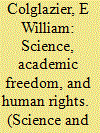

|
|
|
|
|
| Summary/Abstract |
“Academic Freedom in a Globalized World,” in the September issue of Science & Diplomacy is a powerful reminder of the critical importance of academic freedom to the pursuit and advance of science in a world with complexities and dangers. It also emphasizes the importance of the world’s science community in providing support and assistance to colleagues at risk and the challenging questions that are faced in doing so responsibly and effectively.
|
|
|
|
|
|
|
|
|
|
|
|
|
|
|
|
| 16 |
ID:
167397
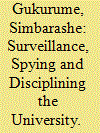

|
|
|
|
|
| Summary/Abstract |
This article examines the deployment of government spies and state security agents on a university campus in Zimbabwe and the implications this has on knowledge production at the university. The campus is presented as a socio-political space in which everyday political struggles are fought. I argue that surveillance is an intractable part of the rhythms of everyday life on campus, and a very specific form of ‘bio-power’, ‘biopolitics’ and violence meant to discipline students and lecturers, as well as the ways in which knowledge is produced and sedimented. Habitualisation of surveillance and fear of surveillance generate Foucauldian ‘panopticon’: producing ‘self-censorship’ on campus.
|
|
|
|
|
|
|
|
|
|
|
|
|
|
|
|
| 17 |
ID:
132062


|
|
|
| 18 |
ID:
192988


|
|
|
|
|
| Summary/Abstract |
This article examines the #SdScandal: the backroom and public fracas surrounding an article on epistemic racism in classic securitization theory that we authored. It argues that what the #SdScandal illustrates is that disciplinary whiteness in international relations has been upheld not despite, but in part through, the ‘critical turn’. Using textual analysis as well as cyber-ethnographic and auto-ethnographic methods, it details how post-positivist knowledge-frames sometimes become vehicles for the rehabilitation of racial-colonial concepts, and how white femininities and novel tender masculinities can be evoked in the defence of institutional hierarchies. That such gendered shifts in disciplinary whiteness (seem to) depart from old-guard ‘white man’s IR’ (per Lake, 2016) only increases their efficacy in securing the status quo. The article further contextualizes this argument about international relations within the broad backlash against resurgent claims for racial justice both inside and outside the academy. It identifies political-intellectual convergences, not only between orthodox and some critical thought, but between right-wing and some self-identified liberal, leftist and/or feminist scholars, especially around the supposed threat of ‘cancellation’ of scholars and scholarship. Examining what critics of the #SdScandal called threats of retribution against this journal, it argues that at stake are issues of editorial independence and academic freedom, and, more broadly, contending visions of how to pursue anti-racism.
|
|
|
|
|
|
|
|
|
|
|
|
|
|
|
|
|
|
|
|
|